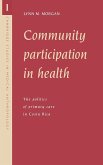Norman Daniels, author of the award-winning Just Healthcare, develops a comprehensive theory of justice for health.
In this new book by the award-winning author of Just Healthcare, Norman Daniels develops a comprehensive theory of justice for health that answers three key questions: What is the special moral importance of health? When are health inequalities unjust? How can we meet health needs fairly when we cannot meet them all? Daniels' theory has implications for national and global health policy: Can we meet health needs fairly in ageing societies? Or protect health in the workplace while respecting individual liberty? Or meet professional obligations and obligations of justice without conflict? When is an effort to reduce health disparities, or to set priorities in realising a human right to health, fair? What do richer, healthier societies owe poorer, sicker societies? Just Health: Meeting Health Needs Fairly explores the many ways that social justice is good for the health of populations in developed and developing countries.
Table of contents:
Introduction; Part I. A Theory of Justice and Health: 1. Three questions of justice; 2. What is the special moral importance of health?; 3. When are health inequalities unjust?: the social determinants of health; 4. How can we meet health needs fairly when we can't meet them at all?; 5. What do we owe each other?: implications of an integrated theory; Part II. Challenges: 6. Global ageing and intergenerational equality; 7. Consent to workplace risk and health protection; 8. Medical professionalism and the care we should get; Part III. Uses: 10. Fairness in health sector reform; 10. Accountability for reasonableness in developing countries: two applications; 11. Reducing health disparities: no simple matter; 12. Priority setting and human rights; Part IV. A Concluding Challenge: 13. International health inequalities and global justice.
Hinweis: Dieser Artikel kann nur an eine deutsche Lieferadresse ausgeliefert werden.
In this new book by the award-winning author of Just Healthcare, Norman Daniels develops a comprehensive theory of justice for health that answers three key questions: What is the special moral importance of health? When are health inequalities unjust? How can we meet health needs fairly when we cannot meet them all? Daniels' theory has implications for national and global health policy: Can we meet health needs fairly in ageing societies? Or protect health in the workplace while respecting individual liberty? Or meet professional obligations and obligations of justice without conflict? When is an effort to reduce health disparities, or to set priorities in realising a human right to health, fair? What do richer, healthier societies owe poorer, sicker societies? Just Health: Meeting Health Needs Fairly explores the many ways that social justice is good for the health of populations in developed and developing countries.
Table of contents:
Introduction; Part I. A Theory of Justice and Health: 1. Three questions of justice; 2. What is the special moral importance of health?; 3. When are health inequalities unjust?: the social determinants of health; 4. How can we meet health needs fairly when we can't meet them at all?; 5. What do we owe each other?: implications of an integrated theory; Part II. Challenges: 6. Global ageing and intergenerational equality; 7. Consent to workplace risk and health protection; 8. Medical professionalism and the care we should get; Part III. Uses: 10. Fairness in health sector reform; 10. Accountability for reasonableness in developing countries: two applications; 11. Reducing health disparities: no simple matter; 12. Priority setting and human rights; Part IV. A Concluding Challenge: 13. International health inequalities and global justice.
Hinweis: Dieser Artikel kann nur an eine deutsche Lieferadresse ausgeliefert werden.









